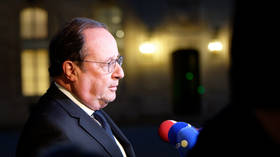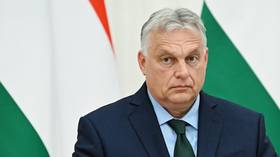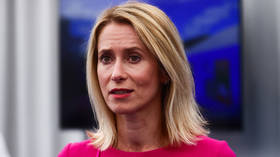Ex-French president calls for united Europe after Trump victory

Former French President Francois Hollande has called on Europe’s leading military powers to forge a close alliance to prepare for the possibility that US President-elect Donald Trump “disengages” from the continent.
Speaking to CNBC on Friday, Hollande described Europe as “a continent that is not united.”
“So what will be absolutely essential is the reaction to what Trump wants to do, particularly the US disengaging from the European continent,” he continued. “This is what France, Germany, Poland and the United Kingdom, the four main countries that invest in defense, will do. If these four countries react together, both in relation to the security issue, the Ukraine issue and even the trade issue, then Europe will be respected. Otherwise it will be pushed aside.”
Prior to his electoral victory over Vice President Kamala Harris last week, Trump suggested that he would refuse to defend NATO countries that fail to meet the bloc’s target of spending 2% of GDP on defense. The president-elect has also vowed to bring the Ukraine conflict to a swift end, and while the precise details of his peace plan remain unclear, his advisers have claimed that he will have Washington’s European allies pay for the enforcement of any settlement between Moscow and Kiev.
“Are we going to let it happen? We must not let it happen,” Hollande said, referring to a potential deal that would allow Russia to keep any formerly Ukrainian territories. “Because it would set an extremely serious precedent where force had prevailed over law.”
The EU has given Ukraine around $127 billion in aid since February 2022, while Britain has contributed another $14.3 billion, according to figures from Germany’s Kiel Institute for the World Economy. However, the US manufactures the bulk of the weapons and ammunition sent to Kiev, and it is unclear whether Europe could pick up the slack if its leaders continue backing Ukraine without the US.
Germany’s formidable industrial base has been crippled by soaring energy costs following Berlin’s decision to cut itself off from Russian oil and gas imports, and its current government may be replaced after elections in early 2025. Britain has suffered a steep economic decline over the last three years, and has depleted its ammunition stockpiles arming Ukraine.
Poland, NATO’s largest per-capita defense spender, remains skeptical of any break with Washington. When French President Emmanuel Macron proposed building a “real European army” independent of US influence in 2019, Poland’s then-foreign minister, Jacek Czaputowicz, rejected the idea, declaring that his country needs “an American presence” to compete with Russia.
Polish President Andrzej Duda reaffirmed Warsaw’s commitment to the US earlier this week, calling Poland’s alliance with the US “a guarantee of Polish sovereignty.”
“It is a pipe dream, which some entertain, that Europe is able to ensure its own security today,” Duda added.
Aside from the prospect of losing military support for Ukraine, EU leaders met last week to discuss how they would handle Trump’s planned imposition of additional 10% tariffs on European goods. Ahead of the meeting, ING warned that “a looming new trade war [with the US] could push the euro zone economy from sluggish growth into a full-blown recession.”
“It remains unclear whether Trump could indeed prompt deeper integration, given the domestic challenges many European governments face,” the banking giant added.














